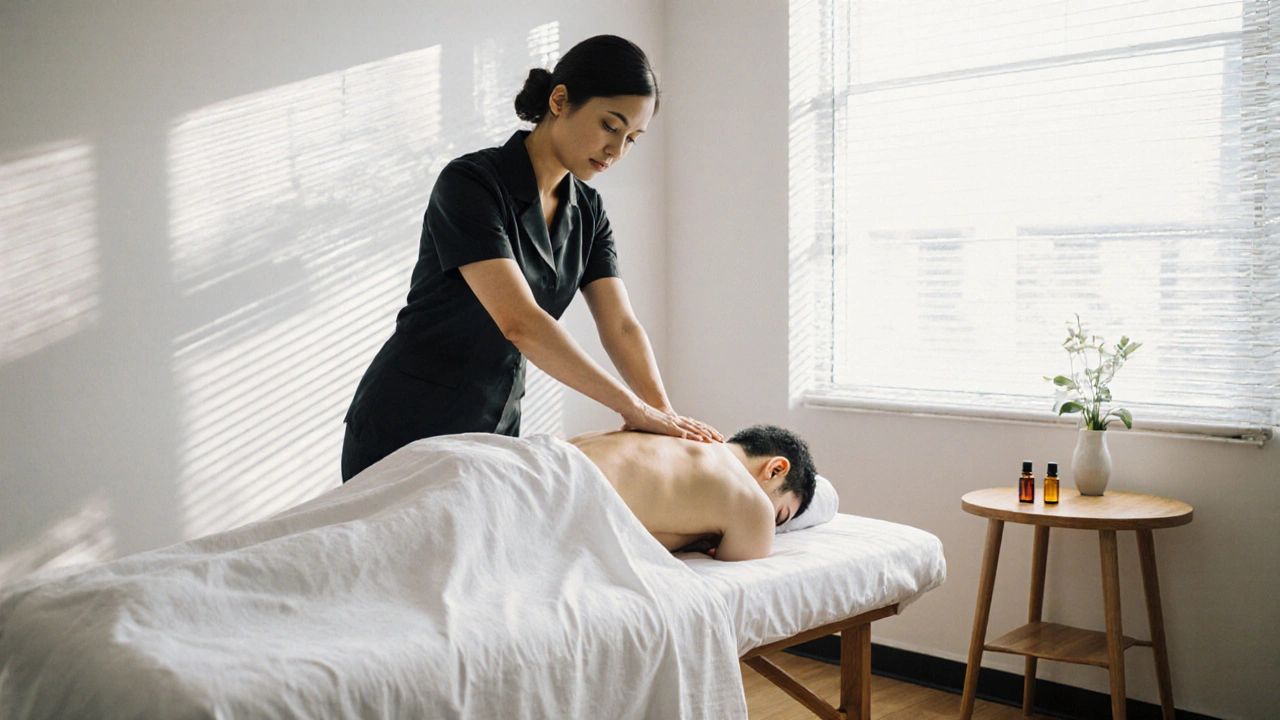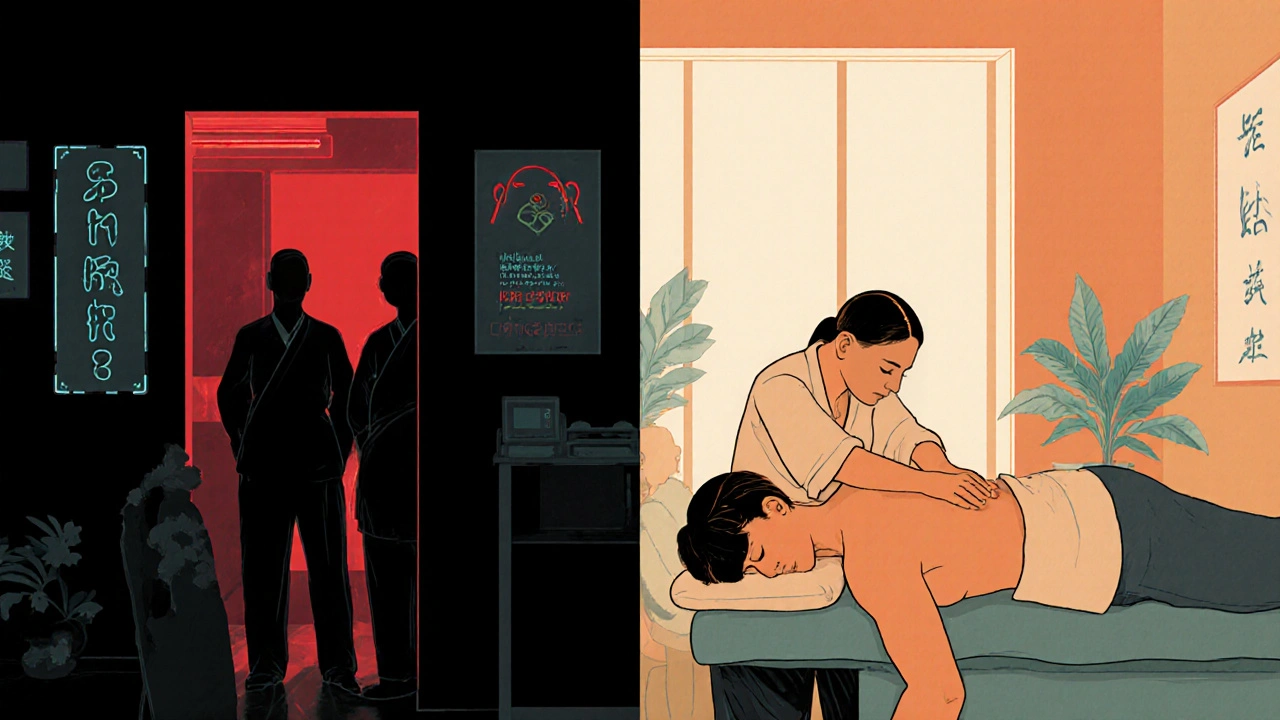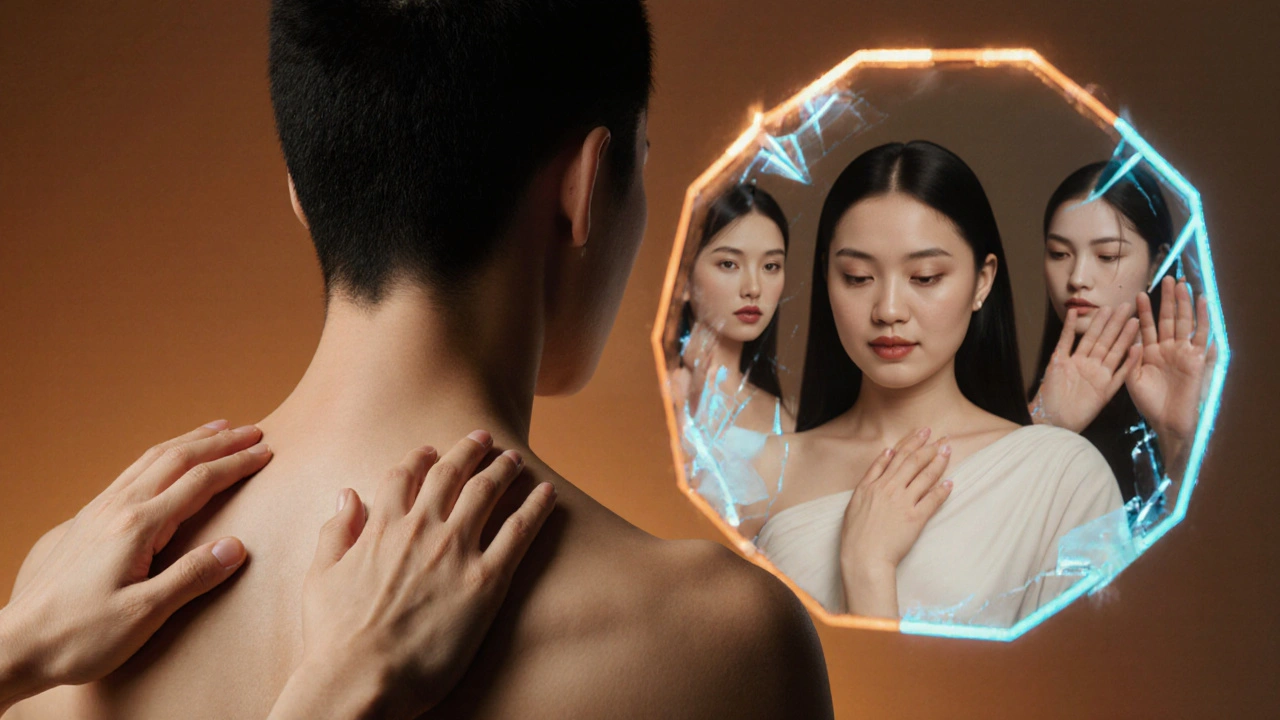Asian Erotic Masseuse: Understanding the Reality Behind the Myth
 Nov, 16 2025
Nov, 16 2025
There’s a lot of noise around the term "Asian erotic masseuse." Movies, websites, and late-night ads paint it as some kind of exotic gateway to pleasure. But what’s actually happening behind that label? If you’ve ever wondered whether this is real, safe, or even legal - you’re not alone. And the truth isn’t what pop culture sells it to be.
The Myth vs. the Reality
The idea of an "Asian erotic masseuse" often comes with stereotypes: mysterious, submissive, skilled in ancient techniques, and always available for more than just a massage. These images are rooted in decades of Orientalism - a Western fantasy that reduces entire cultures to sexualized tropes. Real Asian massage traditions, like Thai massage or Shiatsu, focus on energy flow, muscle release, and balance. They’re rooted in medicine, not seduction.
What gets called an "erotic masseuse" today is rarely tied to any authentic practice. In most cases, it’s a marketing term used to attract customers to services that cross legal and ethical lines. Legitimate massage therapists - whether in Bangkok, Tokyo, or Austin - don’t advertise as "erotic." They’re licensed, trained in anatomy, and follow strict professional codes.
Legal Gray Zones and Risks
In the United States, any massage service that involves sexual activity is illegal. That’s true no matter the ethnicity of the provider or the wording of the ad. "Happy endings," "sensual touch," or "private sessions" are red flags. Law enforcement in cities like Los Angeles, New York, and Houston regularly shut down businesses using these terms as cover for prostitution.
What’s worse? Many of these operations target vulnerable individuals - often immigrants with limited English skills or work permits. They’re pressured into services they didn’t sign up for. The people behind these ads rarely face consequences, but the workers do. Arrests, deportation, trauma - these are real outcomes.
If you’re looking for relaxation or stress relief, there are safer, legal ways to get it. A licensed massage therapist can help with chronic pain, muscle tension, or anxiety - without putting you or someone else at risk.

What Real Massage Therapy Looks Like
A licensed massage therapist in Texas, for example, must complete at least 500 hours of training, pass a state exam, and undergo a background check. They learn about muscles, nerves, contraindications, and boundaries. They don’t ask for private rooms or extra fees for "special services." They work in clean, professional spaces - clinics, spas, or wellness centers.
Here’s what you should expect from a real session:
- Clear pricing upfront - no hidden charges
- Consent forms and privacy policies
- Therapist in professional attire
- Client draped with sheets at all times
- No touching of genitals, breasts, or buttocks - ever
These aren’t just rules. They’re protections. For the client. For the therapist. For the integrity of the profession.
Why the Myth Persists
Why do people still believe in this fantasy? Partly because it’s easy. It’s simpler to think of massage as a transactional, sensual experience than to understand the science behind muscle recovery or nervous system regulation. The media reinforces it. Pornography normalizes it. Ads on social media exploit it.
But the truth is, real healing doesn’t come from mystery. It comes from knowledge, consistency, and trust. A skilled therapist who understands your body can do more for your health than any "erotic" encounter ever could.

What to Do Instead
If you’re drawn to the idea of a relaxing, intimate bodywork experience, here’s what to try instead:
- Book a session with a licensed massage therapist - check their credentials on your state’s licensing board website.
- Try Thai massage or Shiatsu at a reputable wellness center - these styles use pressure points and stretching, not seduction.
- Explore sensuality through mindfulness or tantric practices - these focus on presence, breath, and connection, not performance.
- If you’re seeking intimacy, consider couples counseling or communication workshops - they build deeper bonds than any service ever could.
There’s nothing wrong with wanting pleasure or relaxation. But when you trade real care for a fantasy, you lose more than money. You lose respect - for yourself, for others, and for the people who actually work to heal.
Final Thought: Respect Over Fantasy
The next time you see an ad for an "Asian erotic masseuse," pause. Ask yourself: Who’s really being served here? Is it the customer? Or is it the system that profits from exploitation disguised as pleasure?
Real wellness doesn’t come from secrecy. It comes from clarity, consent, and care. And those things aren’t hidden behind exotic labels. They’re right there - in the hands of trained professionals who want to help, not to sell a myth.
Is it legal to hire an Asian erotic masseuse in the U.S.?
No. Any massage service that includes sexual activity, regardless of how it’s advertised, is illegal in the United States. Terms like "erotic," "sensual," or "happy ending" are commonly used to disguise prostitution, which violates both state and federal laws. Licensed massage therapists are required to follow strict ethical and legal boundaries.
Are there real Asian massage techniques that are sensual?
Yes - but not in the way ads suggest. Traditional Asian techniques like Thai massage, Shiatsu, and Tuina use pressure, stretching, and energy work to relieve tension and improve circulation. These practices are rooted in medicine and require years of training. They don’t involve nudity, sexual contact, or romanticized stereotypes. The word "sensual" here means deeply relaxing - not sexually suggestive.
Why do so many ads use "Asian" in the description?
It’s a harmful stereotype. The term "Asian" is used to evoke outdated, exoticized ideas of mystery and submission. In reality, massage therapists from Asian backgrounds are professionals working in clinics, hospitals, and spas across the U.S. They don’t need to be labeled as "Asian" to be skilled - and reducing their identity to a sexual trope is both inaccurate and disrespectful.
Can a massage therapist be intimate without being sexual?
Yes - but not in the way most people think. A skilled therapist creates a safe, calm space where your body can relax deeply. That can feel intimate because it’s rare to be touched with such care and attention. But intimacy here means trust, presence, and boundaries - not sexual activity. Real intimacy is built on respect, not fantasy.
How do I find a legitimate massage therapist?
Start by checking your state’s massage therapy licensing board website. Look for therapists with current licenses, positive reviews, and clear pricing. Avoid places that don’t list credentials, use vague terms like "private sessions," or ask for cash only. Reputable clinics will have websites, professional photos, and clear policies about consent and hygiene.